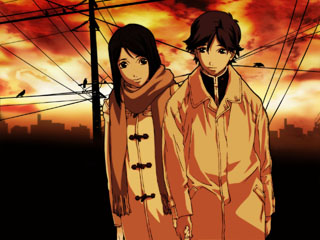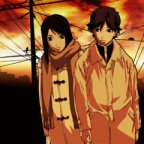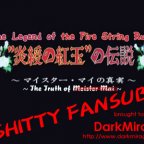Japanese Titbits #1 – 黄昏 (tasogare)
I came across an interesting passage about the origin of the word 黄昏 (tasogare) today. It’s not enough for a proper lesson chapter and I have no idea what topic to dump it under, so I’ve decided to create a brand new section: Japanese Titbits! How exactly does this differ from Katamari, I have no idea. Just accept it. So anyway…
Japanese Titbit #1
According to WWWJDIC, The word 黄昏 (tasogare) is defined as “dusk” or “twilight”. It’s a word that you don’t see much in normal usage outside of poems and songs. The normal word used to refer to evening is 夕方 (yuugata).
Some examples of it being used: .hack//Legend Of The Twilight is known in Japanese as 「.hack//黄昏の腕輪伝説」 (.hack//tasogare no udewa densetsu). See-Saw has a song titled 「黄昏の海」 (tasogare no umi) in its Dream Field album. I looove that song.

The origin of tasogare is pretty interesting.
Long ago, there were no street lights and evening was a time where you couldn’t really make out the faces of other people. It was bright enough that people didn’t need to carry lanterns or lamps but just dark enough to mask any details.
たそがれ
黄昏
tasogare
And when you couldn’t tell who was heading your way, you would ask 「誰そ、彼は?」 “taso, kare wa?“, an archaic expression that means 「誰だあれは」 “dare da are wa” or “Who’s that person?”.
た かれ
誰そ彼は
taso kare wa
Somehow along the way, “taso kare” got turned into one word and became “tasogare“, which is then used to refer to evening. The kanji 黄昏 (which also means evening in Chinese) was added on later.
たそかれ → たそがれ
Just like 今日 (kyou), 明日 (ashita) and 浴衣 (yukata), 黄昏 is a kanji compound that is being used for its meaning rather than its reading. (Edited for factual error)
The reading of tasogare should technically be “koukon” following the on-readings of 黄 and 昏, but it takes on the reading of “tasogare” because of the similar meaning. Therefore, “tasogare” is neither the kun-reading nor the on-reading.
(Editied for additional information)
I forgot to add that tasogare conveys a feeling of loneliness and melancholy when used in songs and poems today. Listen to See-Saw’s “Tasogare no Umi” and you’ll see what I mean.







August 1st, 2006 at 8:31 pm
Very nice piece. Looking forward to more of those in the future! :-)
That etymology is somewhat reminiscent of the (less poetic) French word “vasistas”, a small panel one can open in a closed door to take a peek outside. This comes from the German phrase “Was ist das?” (what’s that?).
As an aside, doesn’t this makes 黄昏 a special reading (熟字訓) rather than an ateji? (As well as kyou, etc. Another funny one is 五月蝿い urusai). I think ateji are the opposite: kanji used for their phonetic value, notably in non-Asian loanwords before the use of katakana was widespread, but also in words like 寿司 sushi.
August 1st, 2006 at 9:00 pm
Yes, my mistake.
It should be:
黄昏, if it were read as an ateji, would be read as “koukon“.
I have slapped myself thoroughly and corrected the mistake. Gah.
August 2nd, 2006 at 12:06 am
I think this was one of the Japanese quirks I read up on an e-book concerning how some of the kanji has readings that are neither on- or kun- readings, nor they were read based on their actual meanings.
It’s quite interesting how the language can be both having a sense of rules and decorum, yet at the same time can have so many exceptions that made the previous rules useless. Just my 2 cents worth.
August 31st, 2006 at 2:48 pm
Happy to find this website. The birth of the word was really interesting. I’m also looking forward to more of those in the future. :)
P.S. The Lyrics are really good. I’ve found ones that I couldn’t find before. Thanks a lot!
October 19th, 2007 at 7:07 pm
lol, this was in the past year O-level Japanese paper wasn’t it?
April 7th, 2009 at 7:25 pm
Great article and great explanation. It always amazes me how words come to be. Especially when most people (including the native speakers) usually don’t know how they came to be that way.